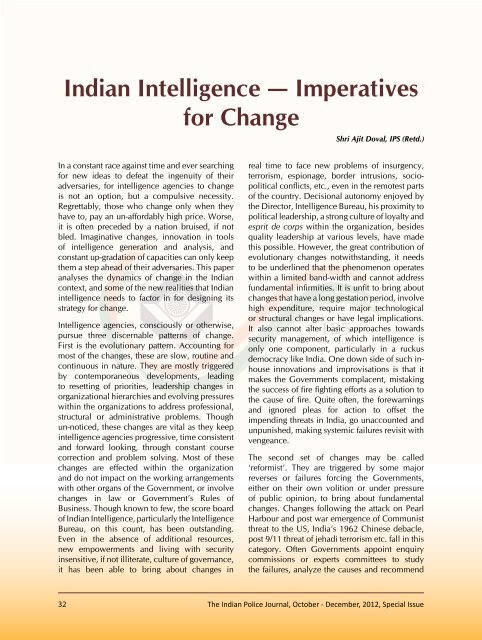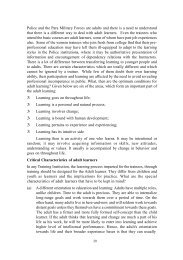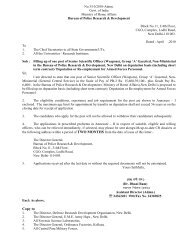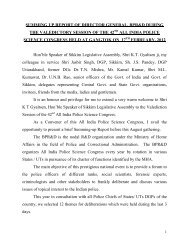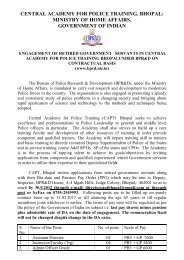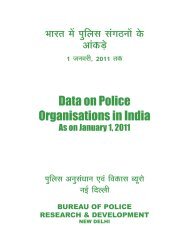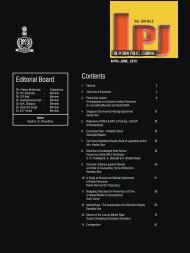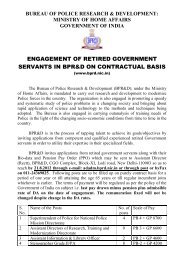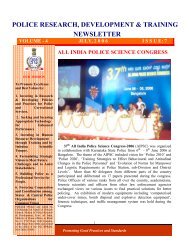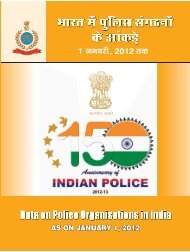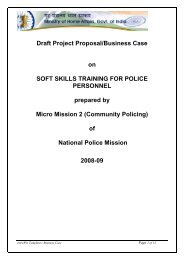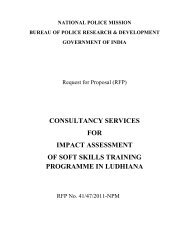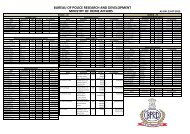Indian Intelligence — Imperativesfor ChangeShri Ajit Doval, IPS (Retd.)In a constant race against time <strong>and</strong> ever searchingfor new ideas to defeat the ingenuity <strong>of</strong> theiradversaries, for intelligence agencies to changeis not an option, but a compulsive necessity.Regrettably, those who change only when theyhave to, pay an un-affordably high price. Worse,it is <strong>of</strong>ten preceded by a nation bruised, if notbled. Imaginative changes, innovation in tools<strong>of</strong> intelligence generation <strong>and</strong> analysis, <strong>and</strong>constant up-gradation <strong>of</strong> capacities can only keepthem a step ahead <strong>of</strong> their adversaries. This paperanalyses the dynamics <strong>of</strong> change in the Indiancontext, <strong>and</strong> some <strong>of</strong> the new realities that Indianintelligence needs to factor in for designing itsstrategy for change.Intelligence agencies, consciously or otherwise,pursue three discernable patterns <strong>of</strong> change.First is the evolutionary pattern. Accounting formost <strong>of</strong> the changes, these are slow, routine <strong>and</strong>continuous in nature. They are mostly triggeredby contemporaneous developments, leadingto resetting <strong>of</strong> priorities, leadership changes inorganizational hierarchies <strong>and</strong> evolving pressureswithin the organizations to address pr<strong>of</strong>essional,structural or administrative problems. Thoughun-noticed, these changes are vital as they keepintelligence agencies progressive, time consistent<strong>and</strong> forward looking, through constant coursecorrection <strong>and</strong> problem solving. Most <strong>of</strong> thesechanges are effected within the organization<strong>and</strong> do not impact on the working arrangementswith other organs <strong>of</strong> the Government, or involvechanges in law or Government’s Rules <strong>of</strong>Business. Though known to few, the score board<strong>of</strong> Indian Intelligence, particularly the Intelligence<strong>Bureau</strong>, on this count, has been outst<strong>and</strong>ing.Even in the absence <strong>of</strong> additional resources,new empowerments <strong>and</strong> living with securityinsensitive, if not illiterate, culture <strong>of</strong> governance,it has been able to bring about changes inreal time to face new problems <strong>of</strong> insurgency,terrorism, espionage, border intrusions, sociopoliticalconflicts, etc., even in the remotest parts<strong>of</strong> the country. Decisional autonomy enjoyed bythe Director, Intelligence <strong>Bureau</strong>, his proximity topolitical leadership, a strong culture <strong>of</strong> loyalty <strong>and</strong>esprit de corps within the organization, besidesquality leadership at various levels, have madethis possible. However, the great contribution <strong>of</strong>evolutionary changes notwithst<strong>and</strong>ing, it needsto be underlined that the phenomenon operateswithin a limited b<strong>and</strong>-width <strong>and</strong> cannot addressfundamental infirmities. It is unfit to bring aboutchanges that have a long gestation period, involvehigh expenditure, require major technologicalor structural changes or have legal implications.It also cannot alter basic approaches towardssecurity management, <strong>of</strong> which intelligence isonly one component, particularly in a ruckusdemocracy like India. One down side <strong>of</strong> such inhouseinnovations <strong>and</strong> improvisations is that itmakes the Governments complacent, mistakingthe success <strong>of</strong> fire fighting efforts as a solution tothe cause <strong>of</strong> fire. Quite <strong>of</strong>ten, the forewarnings<strong>and</strong> ignored pleas for action to <strong>of</strong>fset theimpending threats in India, go unaccounted <strong>and</strong>unpunished, making systemic failures revisit withvengeance.The second set <strong>of</strong> changes may be called‘reformist’. They are triggered by some majorreverses or failures forcing the Governments,either on their own volition or under pressure<strong>of</strong> public opinion, to bring about fundamentalchanges. Changes following the attack on PearlHarbour <strong>and</strong> post war emergence <strong>of</strong> Communistthreat to the US, India’s 1962 Chinese debacle,post 9/11 threat <strong>of</strong> jehadi terrorism etc. fall in thiscategory. Often Governments appoint enquirycommissions or experts committees to studythe failures, analyze the causes <strong>and</strong> recommend32The Indian <strong>Police</strong> Journal, October - December, 2012, Special Issue
eforms. Warren Commission, on the assassination<strong>of</strong> President Kennedy, Senate Committee on theWatergate Sc<strong>and</strong>al, Shah Commission on the role<strong>of</strong> intelligence during emergency in India etc. areillustrative. They examine not only the internalworkings <strong>of</strong> the organization but also functionalrelativity with organizations <strong>and</strong> systems outsidethe intelligence community. Public committeesserve a very useful purpose as they are ableto examine <strong>and</strong> evaluate the functioning <strong>of</strong>intelligence agencies in the broader context <strong>of</strong>political environment, systems <strong>of</strong> governance<strong>and</strong> Iegal-constitutional framework. However,at times, meant only to serve political purposeor silence mounting public criticism, thesecommittees are less than objective <strong>and</strong> swayedby extra-pr<strong>of</strong>essional considerations. Theyalso <strong>of</strong>ten get over influenced by populistperceptions <strong>of</strong> the causes <strong>and</strong> remedies, whichare not always correct. Consequently, theirfindings <strong>and</strong> recommendations do not alwayslead to improvements in the efficiency <strong>and</strong>effectiveness <strong>of</strong> intelligence agencies. The ShahCommission’s findings <strong>and</strong> recommendationsare a case in point. On the contrary, committeeson reforms that are led by the pr<strong>of</strong>essionals, areable to come out with more specific, incisive <strong>and</strong>‘doable’ recommendations. The Shankar NairCommittee report, despite its limited m<strong>and</strong>ate onintelligence reforms, came out with some highlycommendable recommendations.The third category comprises changes that arebrought about by intelligence agencies on theirown, or in conjunction with the larger securityset up <strong>of</strong> the country, envisioning futuristic threats<strong>and</strong> challenges. Transformational in character,they involve constructing future scenarios,assessing the environment in which intelligenceagencies will have to operate <strong>and</strong> calculatinggaps between existing capacities <strong>and</strong> thoserequired to meet emerging threats. This exercisenecessitates intensive study <strong>of</strong> futuristic trends,their implications for national security, analyzingpolicy options <strong>and</strong> formulating strategy for change.Forecasting intelligence needs <strong>of</strong> the country,it should attempt to architect new doctrines,suggest structural changes, aim at optimization<strong>of</strong> resources <strong>and</strong> examine administrative <strong>and</strong>legislative changes required for empowerment <strong>of</strong>intelligence agencies. While intelligence agenciesin developed countries frequently attempt thisexercise, the Indian intelligence has rarely madea conscious effort in this direction. One suchexercise was carried out in the late eighties in theIntelligence <strong>Bureau</strong> on the initiative <strong>of</strong> Shri M.K. Narayanan, just before he was tipped to takeover as the chief.At the national level, the Report <strong>of</strong> the Group <strong>of</strong>Ministers on National Security in 2001, was thefirst macro level attempt in this direction. Thoughit came as an aftermath <strong>of</strong> the SubramaniamCommittee report on Kargil, it was an integratedfuturistic attempt to restructure nationalsecurity under four categories namely, defence,intelligence, internal security <strong>and</strong> bordermanagement. It came with some outst<strong>and</strong>ingrecommendations, but unfortunately with thechange in regime the momentum <strong>of</strong> changecould not be sustained. One <strong>of</strong> the majorrecommendations, that was lost sight <strong>of</strong>, pertainedto the review <strong>of</strong> the national security by a highpowered Groups <strong>of</strong> Ministers, every five years. Ifimplemented, there would have been perspectiveaction plans for intelligence <strong>and</strong> other reforms in2006 <strong>and</strong> 2011. For this category <strong>of</strong> changes to bereally effective, a political will is necessary, thatrequires serious <strong>and</strong> enthusiastic involvement<strong>of</strong> senior political leadership <strong>of</strong> the country. InIndia, national security is a low agenda item,except when the nation finds itself in the midst<strong>of</strong> a serious security crisis. Unfortunately, thatis the most ineffective setting for change. In anideal situation, the Government should developa long term bi-partisan consensus for thesetransformational changes.It needs to be emphasized that both theevolutionary <strong>and</strong> reformist approaches to change,though important by themselves, are inadequateto meet threats <strong>of</strong> the future. These approachesto change are premised on the assumption thatif shortcomings <strong>of</strong> the past were redressed, thefuture would be safe. They allow us to analysethe causes <strong>of</strong> failure, examine existing systems<strong>and</strong> processes, <strong>and</strong> suggest readjustment toprevent their recurrence. The broader legal,administrative <strong>and</strong> security frameworks are takenfor granted; presuming that intelligence would beable to deliver the moon only through changeswithin — every time, everywhere. Unfortunately,this is an erroneous premise. At best, they equipThe Indian <strong>Police</strong> Journal, October - December, 2012, Special Issue 33
- Page 1 and 2: The Indian Police JournalOctober -
- Page 3 and 4: From the Director’s DeskNew Delhi
- Page 5 and 6: 23rd December, 1887: TheJourney beg
- Page 7 and 8: Courtesy - National Archives of Ind
- Page 9 and 10: The Logo released on the completion
- Page 11 and 12: Helmsmen of the IB during thePre-In
- Page 13 and 14: SHRI V.G. VAIDYA, IPS(MAR 1992 TO J
- Page 15 and 16: “Sleeman sahib ki jai”“No Cri
- Page 17 and 18: their life and their problems relat
- Page 19 and 20: Settling down of criminal tribes wa
- Page 21 and 22: perish. Between 1841 and 1848, anot
- Page 23 and 24: In conclusion, I would like to reco
- Page 25 and 26: own race alone, had to be withdrawn
- Page 27 and 28: a bee in his bonnet” 17 , and abo
- Page 29 and 30: epresented by Tilak and his followe
- Page 31 and 32: The agency more and more fine-tuned
- Page 33 and 34: US was brewing, one William Hopkins
- Page 35 and 36: came under the control of Indian mi
- Page 37 and 38: neutralised many efforts by inimica
- Page 39 and 40: e published by the Intelligence Bur
- Page 41 and 42: As DD (Security), IB, I had occasio
- Page 43 and 44: Chhomohlohri, all of them juxtapose
- Page 45: Dormers Building, ShimlaThe Dormers
- Page 49 and 50: and systems will increasingly come
- Page 51 and 52: violence and destabilisation. This
- Page 53 and 54: one develop. The all pervasive cult
- Page 55 and 56: etween the states and the centre su
- Page 57 and 58: Intelligence Agencies inIndian Demo
- Page 59 and 60: Democracies are, today, everywhere
- Page 61 and 62: depend substantially on the restrai
- Page 63 and 64: Of Pistols and Pigs andthe Old Tidd
- Page 65 and 66: it is lovingly caressed hundreds of
- Page 67 and 68: Through the Eyes of an IB OfficerSh
- Page 69 and 70: an Intelligence agency. He used to
- Page 71 and 72: My J&K ExperienceShri R.K. Kapoor,
- Page 73 and 74: there. We remained stranded there f
- Page 75 and 76: Scaling Himalayan Heights withthe I
- Page 77 and 78: proceed to Dungti to supervise the
- Page 79 and 80: tour of the White House and Lincoln
- Page 81 and 82: into unconsciousness two hours earl
- Page 83 and 84: which was completed successfully wi
- Page 85 and 86: leaders. This happened around the t
- Page 87 and 88: My Unforgettable Yearsin the North-
- Page 89 and 90: stated that Prakash Singh, Assistan
- Page 91 and 92: take her into confidence. That woul
- Page 93 and 94: Police - Intelligence InterfaceShri
- Page 95 and 96: Shreekant Bapat and I surveyed the
- Page 97 and 98:
excellence, dedication and commitme
- Page 99 and 100:
Immigration, Inter-State Disputes,
- Page 101 and 102:
Observations on India’s State and
- Page 103 and 104:
assessments that arose after the ca
- Page 105 and 106:
levels. The deficiencies of one par
- Page 107 and 108:
of laying a network of useful roads
- Page 109 and 110:
Technology in Intelligence-Future S
- Page 111 and 112:
These are just some of the aspects
- Page 113 and 114:
Figure 6: Open Source Information o
- Page 115 and 116:
events) and inference from evidence
- Page 117 and 118:
9North Atlantic Treaty Organization
- Page 119 and 120:
Shri Dave was posted back to the lB
- Page 121 and 122:
He even suggested separate pay scal
- Page 123 and 124:
The Unsung HeroesThe Intelligence B


